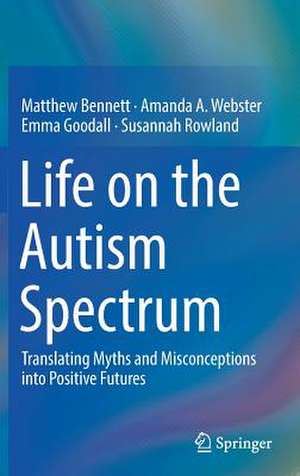Life on the Autism Spectrum: Translating Myths and Misconceptions into Positive Futures
Autor Matthew Bennett, Amanda A. Webster, Emma Goodall, Susannah Rowlanden Limba Engleză Hardback – 18 ian 2019
Preț: 475.49 lei
Preț vechi: 559.41 lei
-15% Nou
Puncte Express: 713
Preț estimativ în valută:
90.99€ • 94.42$ • 76.06£
90.99€ • 94.42$ • 76.06£
Carte tipărită la comandă
Livrare economică 17-31 martie
Preluare comenzi: 021 569.72.76
Specificații
ISBN-13: 9789811333583
ISBN-10: 9811333580
Pagini: 396
Ilustrații: XIII, 232 p. 9 illus.
Dimensiuni: 155 x 235 x 17 mm
Greutate: 0.54 kg
Ediția:1st ed. 2018
Editura: Springer Nature Singapore
Colecția Springer
Locul publicării:Singapore, Singapore
ISBN-10: 9811333580
Pagini: 396
Ilustrații: XIII, 232 p. 9 illus.
Dimensiuni: 155 x 235 x 17 mm
Greutate: 0.54 kg
Ediția:1st ed. 2018
Editura: Springer Nature Singapore
Colecția Springer
Locul publicării:Singapore, Singapore
Cuprins
Translating autism myths into positive futures.- Exploring the identity of individuals on the autism spectrum: reconstructing the autism epidemic myth.- Challenging the public’s perception of life on autism spectrum: the impact of the vaccination myth.- Establishing contexts for support: undoing the legacy of the ‘refrigerator mother’ myth.- Creating inclusive societies for individuals on the autism spectrum: negating the impact of the ‘autism can be cured myth.- Understanding the “true” potential of people on the spectrum: debunking the savant syndrome myth.- Creating contexts for communication in a verbal world: confronting the myth autistics don’t talk.- Constructing contexts for success in a social society: undoing the impact of the behavior/mental disorder myth.- Establishing social inclusion the autism way: denying the ‘they don’t want friends’ myth.- Social-emotional connectivity on the autism spectrum: transforming the ‘lack of empathy’ myth.- Intimacy and romance across the autism spectrum: unpacking the ‘not interested in sex’ myth.- Supporting self-advocacy and self-determination on the autism spectrum: refuting the ‘autism can be outgrown’ myth.
Notă biografică
Dr Bennett holds a PhD in Disability Studies from Flinders University. For his PhD he examined the life experiences of adults with Asperger syndrome. Specifically, their education, depression, employment, and intimate relationship experiences. He has lectured in Disability Studies at Griffith University, Queensland, and is an advocate for the rights of people on the autism spectrum. Dr Bennett plays an active role in directing research about the autism spectrum in Australia. He is an advisor for the Australian Government’s AutismCRC, a project which aims to understand the needs of people on the autism spectrum in Australia. Dr Bennett has an exceptional research profile. He has been a guest speaker for the 2015 Asia Pacific Autism Conference in Brisbane and has also written articles and has been a blind reviewer for the Journal of Autism and Developmental Disorders.
Amanda Webster is passionate about creating inclusive communities where children on the spectrum are supported to become confident and self-efficacious adults. She is a Senior Lecturer at the Faculty of Social Sciences, University of Wollongong and is recognised nationally for her work on the creation of effective school communities for students on the autism spectrum and their families in Australia. Amanda has worked closely with individuals on the autism spectrum and their families for nearly 30 years as a school leader, teacher, early intervention advisor, education consultant and behaviour analyst in the USA and Australia. She has served as the director of postgraduate autism programs at two universities and is currently a researcher at the Australian Cooperative Research Centre for Autism.
Emma Goodall is passionate about helping families and schools to facilitate success for children on the spectrum. She is an autism author, researcher and consultant in South Australia and sits on the executive committees of the Australian Society for Autism Research and the Autistic Self Advocacy Network of Australia, New Zealand and Oceania. Emma develops, reviews and helps implement research-based policies and programs that enable students on the autism spectrum to flourish. She combines her professional and academic skills and knowledge with her lived experience of Asperger’s to help people understand what it means to be on the autism spectrum and how different life is for those on and not on the spectrum.
Susannah Rowland is currently completing her PhD through the University of Wollongong. Through her research she hopes to build better understanding of the risk and protective factors of bullying for adolescents with an autism spectrum disorder, in mainstream secondary schools. Susannah has worked as an early childhood educator and director in Australia and Hong Kong, and as an early years co-ordinator in London. Her teaching experience includes working with children from diverse backgrounds, in a variety of educational settings. On graduation from her PhD, she aspires to work with families and individuals on the autism spectrum, providing support to assist them to strive towards goals and best outcomes.
Textul de pe ultima copertă
This book presents a unique exploration of common myths about autism by examining these myths through the perspectives of autistic individuals. Examining the history of attitudes and beliefs about autism and autistic people, this book highlights the ways that these beliefs are continuing to impact autistic individuals and their families, and offers insights as to how viewing these myths from an autistic perspective can facilitate the transformation of these myths into a more positive direction. From ‘savant syndrome’ to the conception that people with autism lack empathy, each chapter examines a different social myth – tracing its origins, highlighting the implications it has had for autistic individuals and their families, debunking misconceptions and reconstructing the myth with recommendations for current and future practice. By offering an alternative view of autistic individuals as competent and capable of constructing their own futures, this book offers researchers, practitioners, individuals and families a deeper, more accurate, more comprehensive understanding of prevalent views about the abilities of autistic individuals as well as practical ways to re-shape these into more proactive and supportive practices.
Caracteristici
Presents current research from across education, psychology, disability studies, and medicine Enriches and expands directions for future practice Offers a neurodiversity perspective on autism myths
